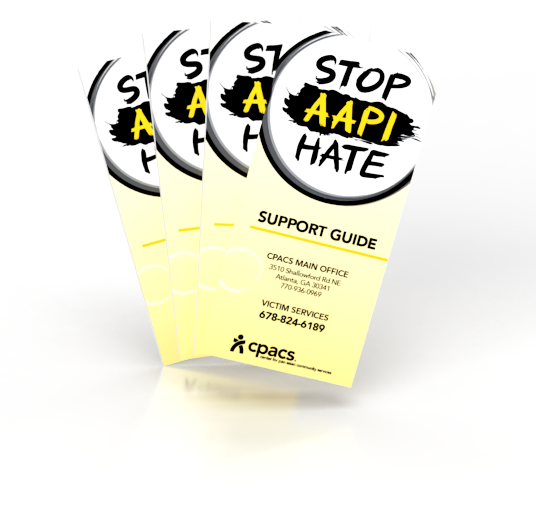Stop AAPI Hate Support Guide
Content
1. What is a Hate Crime
1.1 Hate Crime
1.2 Bias or Hate Incident (Not a Hate Crime)
2. Why it is important to report?
3. I was a victim of Hate Crime, What do I do?
4. As a bystander, what do I need to know?
5. As an ally, how can I help the Asian American & Pacific Islander (AAPI) community?
6. Glossary
What is a Hate Crime
Hate Crime:
Any act or attempted act constitutes an offense under criminal law that is motivated by bias against race, color, religion, national origin, sex, sexual orientation, gender, gender identity, disability, mental disability, or physical disability. This includes: physical attack such as assault, murder, arson, property damage, threats, and harassment.
Bias or Hate Incident (Not a Hate Crime):
Any acts of prejudice that are not crimes and do not involve violence, threats, or property damage.
Examples: name calling, insults, or displaying hate material on your property or public places.
Why it is important to report?
- Citizen or not, you have rights.
- Don’t be ashamed or in denial. You are not alone in this and there is community to support you.
- By reporting you may be able to get financial assistance.
- Help other victims of crime.
- Police can charge the perpetrator and prevent them from doing it again.
- Law enforcement will have that data on hate crimes and will be able to put resources to prevent future incidents.
.
I was a victim of Hate Crime, what do I do?

1. Get medical help, if needed.

2. Record the incident, if possible.

3. Write down any and all of the details of the crime as soon as possible after the incident.
- Include the attacker[s] gender, age, height, race, weight, clothes and other special or noticeable traits like tattoos or piercings. If there are any threats or biased comments made.

4. File a police report.
- Get the officer’s name and badge number.
- Make sure the officer takes your testimony and assigns a case number. A week after the incident, call the police station with the case number to get a copy of your report emailed to you, or go in person and ask for one.
- If you believe the incident was bias-motivated, urge the officer to check the “hate/bias-motivation” or “hate crime/incident” box on the police report.

5. Notify your local community organization
- such as CPACS, about the –incident. Call CPACS Victim Services Line at 678-824-6189

6. Find support:
- Friends and family.
- Get professional help. Find a list of resources on the back of this brochure.
As a bystander, What do I need to know?

1. Focus on the victim, not the perpetrator
- Examples: talk to the person being harassed, pretend to know them, and casually lead them away from the perpetrator. Try to pull other individuals in and ask them to help.

2. Record the incident
- Record the incident if you can, in a safely and responsibly way.
- If you record the incident, give it to the victim and let them decide what to do with it. Directly posting the recorded incident to social media might cause the victim more harm than good.

3. Call out problematic behavior
- If you do decide to directly engage with the perpetrator, call their behavior out loud. Some examples include:
- “That’s inappropriate, disrespectful, not okay, etc.”
- “That’s homophobic, racist, etc.”
- “Hey! Stop that!”

4. Call the police – but ask the victim first
- If someone is in need of medical assistance, call 911. Ask the person being harassed whether or not that’s something they want.
- Call 1-844-9-NO-HATE (664283) where trained staff and volunteers will provide legal information about hate incidents and crimes, reporting, as well as the kinds of legal remedies that may be available in different states.

5. Check in on the victim of the abuse
- Some examples include asking the victim if they’re okay, accompanying them to their destination, or just sit with them for a while can also help.
As an ally, how can I help the Asian American & Pacific Islander (AAPI) community?
- Listen to what Asian Americans and/or Black, Indigenous, and People of Color (BIPOC) say, hear their stories, feelings, and opinions.
- Get training and education.Find resources through books, articles, films, etc., about the history and current issues they are facing.
- Welcome and challenge one’s own discomfort & prejudice.
- Get involved. Join local groups fighting for social injustice. Follow them on social media.
- Show support. Attend AAPI community events.
- Take action to create interpersonal, societal, and institutional change. Address it with government/law enforcement. Hate crimes are real to people of color, and the law needs to reflect their reality.
- Speak up. Speak out. Silence allows oppression to continue.
- Be present and bear witness when people of color are under attack.
- Help with data & reporting. Not all incidents are reported.
- Stay engaged. Racism and anti-Asian acts of violence are a public mental health problem. When the news cycle moves on, our efforts against racism and acts of violence must continue.
- Learn from your mistakes. Listen, apologize, and change your behavior moving forward.
- Donate to support local AAPI organizations that fighting for communities.
- Support local AAPI businesses.
Glossary
Contact Us
CPACS Main Office
3510 Shallowford Rd, Atlanta, GA 30341
T. (770) 936-0969
F. (770) 458-9377
CPACS Crisis Line: (678) 824-6189
Hours
Monday-Friday 9AM – 5PM
Saturday-Sunday: Closed



